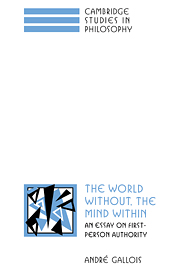2 - Scepticism about first–person authority
Published online by Cambridge University Press: 23 January 2010
Summary
We have examined a number of attempts to characterize first-person authority. All except one have been found wanting. We appear to have first–person authority over our propositional attitudes in this sense. If I consciously hold a propositional attitude then I am in a position to know a priori that I do so. In this sense there is an asymmetry between the kind of knowledge I can have of my propositional attitudes, and the kind of knowledge someone else can have of my propositional attitudes. Moreover, that asymmetry is non–contingent. If it is true, it is not contingently true that I alone know a priori what consciously held propositional attitudes I have.
My aim is to give an account of first-person authority. Some deny that what I aim to give an account of exists. Some maintain that any difference between ones own and another's knowledge of one's psychological states is, at best, contingent. Hostility to first-person authority occasionally arises from conflating first-person authority with non-contingent privileged access. Having first-person authority over a range of psychological states implies that there is a non-contingent asymmetry between the epistemic access one has to one's own states belonging to that range, and another's epistemic access to one's own states belonging to the same range. On the other hand, an individual has non-contingent privileged access to psychological states of a certain type if she is necessarily in a better position than anyone else to tell whether she is in a state of that type.
- Type
- Chapter
- Information
- The World Without, the Mind WithinAn Essay on First-Person Authority, pp. 31 - 42Publisher: Cambridge University PressPrint publication year: 1996



